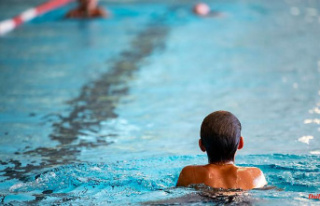Especially in Serbia, members of the LGBTQ community have a hard time. This can also be seen at the Europride parade in Belgrade. Although this takes place to a limited extent, it is accompanied by violent counter-protest.
Despite a ban by the Serbian government, thousands of people took part in this year's Europride parade in Belgrade. Under strong police protection and in the rain, they covered the shortened distance of a few hundred meters between the Constitutional Council and a nearby park. According to the television station N1, there were clashes between counter-demonstrators and police officers. The Interior Ministry reported 31 arrests.
The Interior Ministry had banned the major pan-European event of the LGBTQ movement on Tuesday due to security concerns about announced counter-protests. Although it also banned all counter-events, some right-wing extremist groups still wanted to march and post themselves in front of churches.
As journalists from the AFP news agency reported, police officers kept pushing back small groups of cross-waving counter-demonstrators on the sidelines of the march. According to the broadcaster N1, some counter-demonstrators got into violent arguments with the emergency services. They threw smoke bombs at the officers and damaged several vehicles.
Serbian President Aleksandar Vucic had already announced that Europride would be canceled or postponed at the end of August. As justification, he referred to bottlenecks in the energy and food supply as well as security concerns.
The subsequent actual ban on the event by EU accession candidate Serbia triggered international protests. The embassies of more than 20 countries - including Germany, the USA, France and Great Britain - called on the government in Belgrade to lift the ban. At least 15 MEPs had announced that they would take part in the demonstration out of solidarity. The federal government's queer commissioner, Sven Lehmann, also wanted to take part.
"I've been to several Pride parades, but this one is a little more stressful than the others," said British activist Yasmin Benoit. "I come from the UK, where everyone is more united and it's more commercial," she said, adding, "But this is really how Pride should be." She was referring to the social struggle that stood at the beginning of the movement.
Europride has been held in a different major European city every year since 1992. The Pride March on the penultimate day of the event week is comparable to the Christopher Street Day parade.
Last Sunday, thousands of opponents of the Pride March, including supporters of right-wing extremist groups, motorcycle rockers and Serbian Orthodox priests, demonstrated in Belgrade against the first Europride parade planned in Serbia. Same-sex marriages are not legally recognized in Serbia, and homophobia remains widespread in the country. The English abbreviation LGBTQ stands for lesbian, gay, bisexual, transgender and queer.












